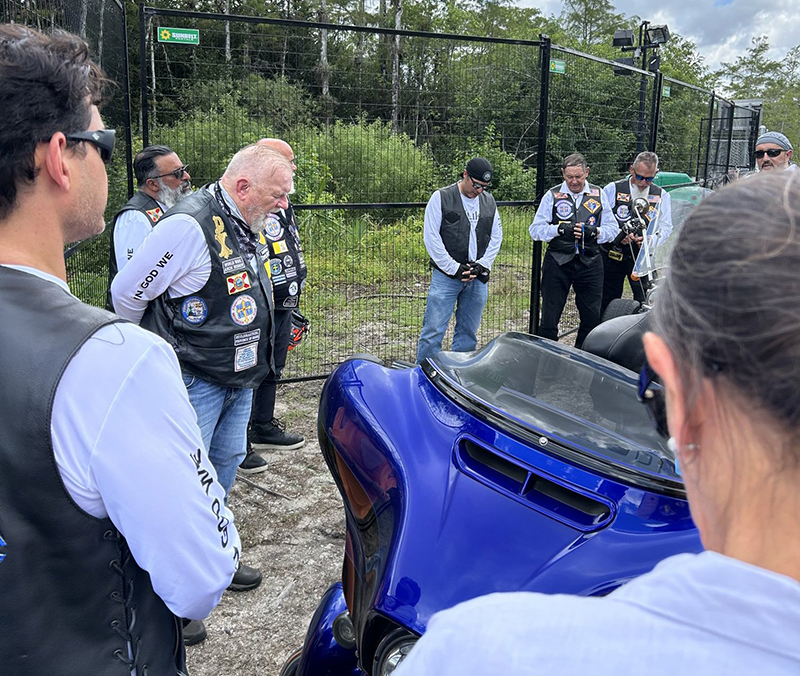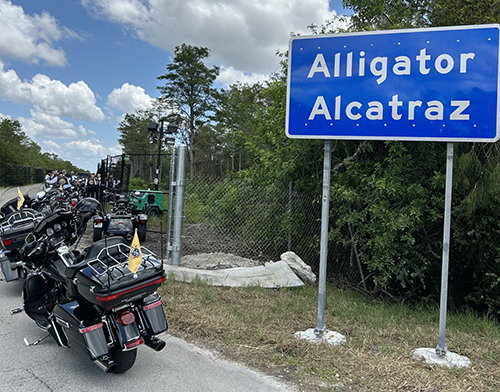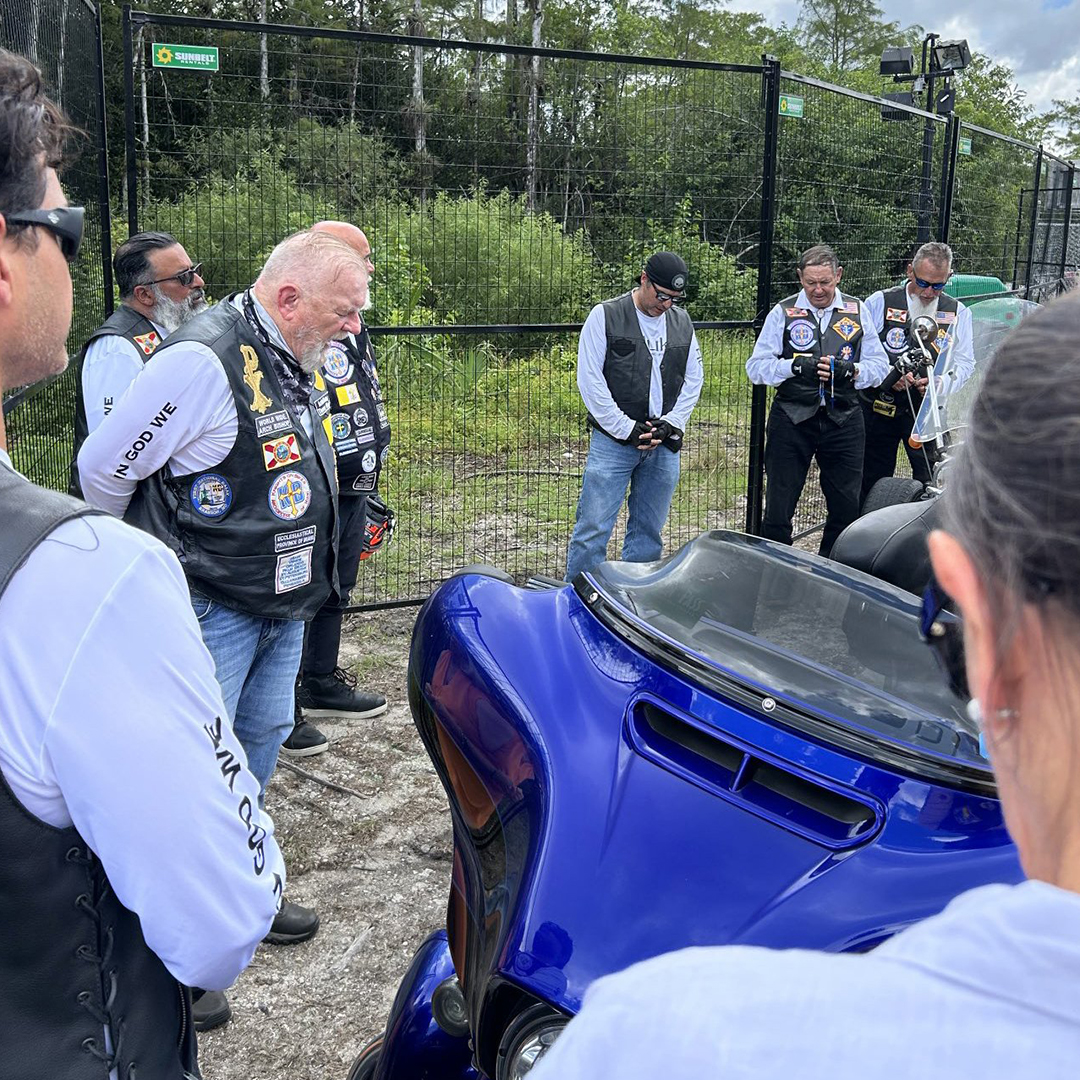By Tom Tracy - Florida Catholic
MIAMI | To ensure pastoral care and chaplain visitation privileges at the so-called Alligator Alcatraz detention facility, Archbishop Wenski visited the site on July 20, 2025, which is situated at the Dade-Collier Training and Transition Airport about 55 miles west of downtown Miami.
Archbishop Wenski led about 25 members of the Knights on Bikes, a group of the Knights of Columbus, in praying the rosary outside of Alligator Alcatraz after being denied entry.
Recently, the detention center has been a source of human rights concerns and political controversy due to its role in immigration enforcement under President Donald Trump. Alligator Alcatraz is a planned 5,000-bed immigrant detention center and possibly the first of several new emergency detention centers to be located in Florida and beyond.
Florida’s Republican Gov. Ron DeSantis used emergency powers to expedite the construction of the new facility, drawing criticism from local environmentalists, immigrant advocates and Native American nations based in South Florida.
On July 22, Archbishop Wenski spoke with The Florida Catholic about his visit to the detention center and discussed immigration policy.

Photographer: Courtesy
Archbishop Thomas G. Wenski (second from left) and the Knights on Bikes of the Knights of Columbus pray the rosary for detainees at the entrance of Alligator Alcatraz, an immigration detention center in the Florida Everglades July 20, 2025.
Q. Can you tell us about the visit with the ‘Knights on Bikes’?
R. Last Sunday, I had planned to go with the Knights on Bikes on a previously scheduled ride to Everglades City after Mass at one of our parishes. So I met them, and I said, “if we are going out to Everglades City, that goes right by Alligator Alcatraz, so why don't we stop there?” We pulled in, we got a place to park, and we prayed the rosary together, finishing about five decades by noon. It was a moving experience for the Knights and for myself.
Q. Where do things stand with your ongoing efforts to gain access to Alligator Alcatraz?
R. I am still waiting for a response. We haven't gotten a response yet. Deacon Edgardo Farias (director of the Archdiocesan Prison Ministry) is ready and willing to schedule something when someone contacts him. We also have Michael Sheedy at the Florida Catholic Conference reaching out to state officials, and Congressman Carlos Gimenez has continued to reach out on our behalf. But we have been getting the runaround so far.
Q. Can you draw any comparisons between the Guantanamo detention center and Alligator Alcatraz?
R. I didn’t go inside, but I saw the pictures that were in the media when the president and the governor went through there. We only got to the access road to the prison and the Florida Highway Patrolman told us we couldn’t go further. We parked our bikes and prayed the rosary, but the detainees were not even aware that we were there.
Q. Archbishop, why is prison ministry in general important, and why would it be imperative for our clergy and perhaps yourself, to have pastoral care access to Alligator Alcatraz?
R. Visiting the prisoners is one of the corporal works of mercy and the Church has always done that — but in this particular circumstance, it almost seems to be an intentional effort to dehumanize these people. Offering Mass is an opportunity to humanize the detainee, to elevate their dignity and also to assure them that they are not forgotten by God. That is why prison ministry is important in any context where people are being detained or deprived of their freedom, especially in this context.
Q. Is a precedent being set here in terms of the lack of access to pastoral care at that facility thus far?
R. Over the years in different states and even in different counties in Florida, we have had some difficulties. In some rural areas of Florida the prisons could not understand why we wanted to bring wine into the prison — you have to have wine if you are going to celebrate Mass. And during Lent, I learned that Krome Detention Facility (in Dade County) wasn’t allowing priests to come in to celebrate Mass. When we asked why, we were told Krome was overcrowded. Well, that is not an acceptable excuse. The solution to that is to reduce the overcrowding, not to eliminate Mass. So I called Congressman Gimenez and he made a few calls on my behalf, and the ban on Masses was lifted. I went there on Easter Sunday and celebrated two Masses.
Q. What did you witness there at Krome?
R. I had to make some accommodations. They told me that they couldn’t let me celebrate Mass in the cafeteria – which was the biggest space – and that because of the numbers that they had to schedule the meals program for one group, then another and so on. They gave me a room that could seat about 80 people, and I said one Mass and then another Mass right after that. There were more than 1,000 people at Krome and I don't know how they picked who could go to Mass, but I had a representative group at each Mass. When I talked with them, they were from almost every country in Latin America and a couple of countries in Africa. It should not be an irresolvable problem. Detention facilities have had pastoral services - even when they have Haitian detainees down in Guantanamo (in Cuba), we had priests visiting.

Photographer: Courtesy
The entrance to Alligator Alcatraz, an immigration detention center in the Florida Everglades, where Archbishop Thomas G. Wenski and the Knights on Bikes of the Knights of Columbus prayed the rosary for detainees on July 20, 2025.
Q. In general, what are you hearing from the area pastors in light of stricter immigration enforcement and recent cancellation of immigration protection programs?
R. It’s a mixed situation. Some pastors have reported that a few parishioners have been detained or deported. Other pastors are saying some parishioners are laying low and not going to Mass, while others are saying that Mass attendance is not yet affected. I spoke with our pastor in Key West, and he said the Hispanic Mass attendance has gone down, but the attendance at the Haitian Mass has stayed the same — with most of the Haitians, their Temporary Protected Status (TPS) is extended until February 2026, so they don't have to worry right now. We should remember that not everyone is undocumented. Some people have TPS, which means they are known to the government, have social security numbers and work permits. Others have humanitarian visas from Cuba, Haiti, Nicaragua and Venezuela, and these people have work permits. They didn’t enter the country illegally.
Q. What is your advice for immigrants who are considering the safety of attending Mass?
R. First of all, the U.S. government has not invaded any church to my knowledge. They have said so themselves — that they have not gone into any church. Churches are private property and in order to enter the church and to arrest somebody on an immigration charge, an (immigration enforcement) officer would have to have a legal warrant. And so, there is more risk in going to the bodega than going to the church. Bodegas are also private property, but they are not sensitive areas as are churches, schools and hospitals.
Q. You said there are better ways to manage immigration than through enforcement alone.
R. Stopping TPS and doing away with humanitarian visas… doesn’t seem to be a good way of approaching this issue. We have to look beyond just enforcement only; we have to look at other ways of regularizing the statues of some of these populations — people who are not criminals and who are hardworking people trying to create a future of hope for themselves and their children. President Trump says he wants to control the borders, and he has done that; he wants to remove the bad actors, and he is doing that. He also says he wants the best economy in the world — but you can't have the best economy in the world without counting on the labor for the participation of immigrants. Otherwise, how are you going to maintain the growth of the economy?
Q. Finally, what are your thoughts on the overall situation as the archbishop of Miami?
R. South Florida has shown that immigration is ultimately a benefit to the larger community; immigrants are not a problem; they are an opportunity. We have successfully integrated successive waves of migrants. Miami is seen throughout the world as an especially migrant place and part of that vibrancy is the immigrant story of the people who live here. So I think, rather than creating fear of the migrant, the experience of Miami should show there is nothing to fear — but much to be gained — by welcoming the migrant.


Comments from readers